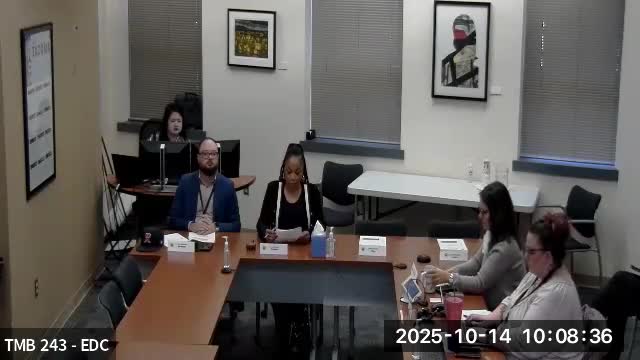Committee reviews draft 2026–2030 community and economic development strategic plan
Get AI-powered insights, summaries, and transcripts
Subscribe
Summary
The Tacoma City Council Economic Development Committee on Oct. 14 reviewed a draft 2026–2030 Community and Economic Development strategic plan that frames the department's priorities around equitable growth, metrics-driven accountability and sector-focused business retention.
The Tacoma City Council Economic Development Committee on Oct. 14 reviewed a draft 2026–2030 Community and Economic Development strategic plan that frames the department's priorities around equitable growth, metrics-driven accountability and sector-focused business retention.
The draft, presented by Debbie Bingham, director of the Community and Economic Development (CED) department, and Carol Wolf, division manager for business services and workforce, emphasizes data-driven targets, clearer definitions of roles and responsibilities, and a focus on the green, blue and creative economies. “This plan reflects the lessons we’ve learned over the past 5 years and outlines a bold equity centered vision for Tacoma’s business growth and economic future,” Bingham said.
The committee was shown refined focus areas that separate what CED will own, what it will influence and what it will monitor. Presenters said the update reorients workforce investments toward pipeline development aligned to industry need and ties small-business support to anti‑displacement tools such as targeted revolving loan funds. Presenters said the plan excludes housing and arts and culture as those areas have separate plans; it aligns CED work with the 1 Tacoma comprehensive plan, the Tideflats subarea plan and the Climate Action Plan.
Carol Wolf described a sector-specific approach to business retention and attraction: “We are now sector specific with a focus on green, blue, and creative industries,” she said, and added a boxed definition in the draft that “traded sector refers to goods or services produced for sale outside of our region.” Committee members said they supported that emphasis and asked for wage and job‑quality measures to appear alongside openings and closures.
Presenters discussed several operational initiatives the department has already begun or plans to expand: - Business Engagement Solutions Team (BEST): a cross‑departmental concierge model to shorten response times and route businesses to the right city contacts. Staff said the committee will receive debriefs on BEST’s early results. - Manufacturing incubator: staff described a Tacoma Manufacturing Incubator that will create co‑located production and training space. Presenters said the facility already has 15 manufacturing studios under development, will begin cohort recruitment in January and offers up to 225,000 square feet of space for growth. - Revolving loan funds and an Emergent Needs Business Loan Fund: the draft includes language about using revolving funds for micro‑enterprise and to sustain community reinvestment efforts as loans are repaid. - Permitting pilot and coordination: presenters reported an existing pilot in permitting designed to improve coordination across city departments and reduce friction for businesses; they said more monitoring and education for smaller applicants will be needed.
Committee members pressed for specific metrics on job quality, wage growth and underemployment so the city can measure whether attracted or expanded businesses produce the kinds of jobs residents need. Several council members also urged early, practical talking points and constituent‑facing collateral so council members can explain the plan in district meetings.
Examples given to illustrate the department’s concierge approach included rapid coordination to repair a tagged mural and working with a business to retain a sidewalk café where access to underlying infrastructure required relocation. Bingham said those quick responses build trust and produce downstream benefits, such as businesses expanding to other neighborhoods.
No formal legislative actions were taken on the plan at the Oct. 14 meeting. Staff said the document is a framework and that metrics and draft text will be returned for additional committee feedback before finalization.
The committee scheduled additional briefings and said staff will provide quarterly metric updates once the plan is finalized.
